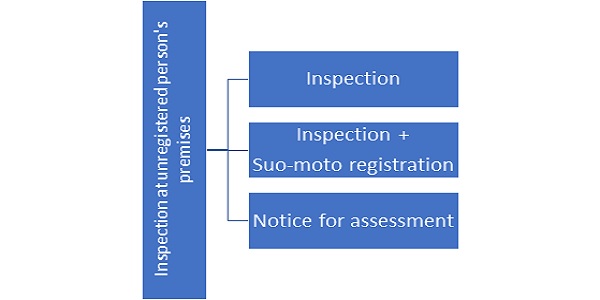Summary: Unregistered persons, primarily small and medium enterprises (SMEs), often face inspections by GST officials, driven by fears of potential inquiries despite their compliance with GST regulations. The validity of these inspections is governed by the CGST Act, 2017, which outlines three primary options for departmental access. The first option, under Section 67, allows inspections only if officers have a documented “reason to believe” rather than mere suspicion. The second option combines inspection with suo-moto registration under Section 25, which necessitates a valid basis rooted in the preceding inspection or search. However, the Act does not provide exclusive powers for inquiries or surveys, making it questionable whether officers can initiate suo-moto registrations based solely on these. The third option involves issuing a notice for assessment, requiring grounds for assessment to comply with natural justice principles, but does not authorize direct inspections. Overall, access to the premises of unregistered persons is not straightforward; officers must conduct thorough preparatory work and provide official communication affirming their actions before proceeding.
Inspection/Access at unregistered person’s premises
Unregistered persons’ generally comprises of SME’s category. Their aim is always to reach to the next level of entrepreneurship world. Due to the exemption criteria set for different states, they are not registered under GST Act. Being alien to the GST Act, the fear of any enquiry is always more, though no wrongdoing (under the GST Act) lies on their part. Such fear is explored by departmental officers by inspecting or accessing unregistered person’s place of business. In this article, we will test its validity in conformity with the CGST Act, 2017 and rules laid thereunder.
In our opinion, there can be only three ways by which such inspection/access is backed by the Act, which is showcased below for ease of reference :

Option I – Inspection (Section 67)
Inspection powers are provided under Section 67 of the Act whereby it is open for officers to inspect unregistered person’s too. An important point to be noted here is that the root of such inspection needs to be backed by reasons. Reason to believe such inspection is to be recorded in internal files of department meant for a specific unregistered person. Kindly note that ‘reason to suspect’ and ‘reason to believe’ is way different. Former reasoning involves doubt whereas later reasoning involves reasonable belief with a justification. There are various case laws which summarizes reason to believe does not mean reason to suspect.
Hence for opting this option, an officer needs to convey his reason to believe and then proceed for inspection. Direct access for inspection with reasons of suspicion is not allowed in this option.
Option II – Inspection + Suo-moto registration (Section 67 + Section 25 r.w. Rule 16)
Officer has power to grant suo-moto registration to unregistered person via Section 25 (8) read with Rule 16 which should be in the course of pursuance to proceedings of the Act. Now Rule 16 in line with pursuance of such proceedings, provides following proceedings to proceed for suo-moto registration :
- Enquiry
- Survey
- Inspection
- Search
Interestingly, there are no exclusive powers under the Act for enquiry and survey. This is exclusively mentioned in Rules only. Without backing of the Act, how can an officer just by an enquiry and/or survey (as per rules) can proceed for suo-moto registration is a question in itself.
Now remains inspection and/or search. Again as per Option-1 discussed above, inspection and/or search require their own parameters to be fulfilled. Suo-moto registration by an inspection/search per se (without reasons to believe) is not allowed under Section 67 of the Act. Hence resort to suo-moto registration should flow from Section 67 only. Thereby Section 67 should be fulfilled to proceed for Section 25 with regards to suo-moto registration. Again direct access for inspection with reasons of suspicion is not allowed in this option.
Option III – Notice for Assessment (Section 63 r.w. Rule 100)
Another option that remains to gain access to unregistered person’s premises is to issue a notice for assessment which is nothing but best judgement assessment. Here two things are of primary significance :
- Rule 100 makes it a compulsion to contain grounds on which assessment is proposed (which is in line with Section 67 requirement of ‘reasons to believe’).
- Section 63, like all proceedings, provides for opportunity of being heard in line with natural justice.
This option is to be exercised by departmental officers, sitting in their office only. Inspection/access right at business premises is not given here.
Summary
Summarizing all options together, access to business premises of unregistered persons’ is not cakewalk for any departmental officer. Access to such business premises is exercised for extracting information and data to be launched for proceedings. Homework for launching proceedings infact needs to be made beforehand and an official communication affirming such proceedings is what law provides for.
*****
Author: CA Sagar V Shah | Sagar V. Shah & Associates | (Chartered Accountants) | E : casvsassociates@gmail.com
DISCLAIMER: The views expressed are strictly of the author and Sagar V Shah & Associates. The contents of this article are solely for informational purpose. It does not constitute professional advice or recommendation of firm. Neither the author nor firm and its affiliates accepts any liabilities for any loss or damage of any kind arising out of any information in this article nor for any actions taken in reliance thereon.




